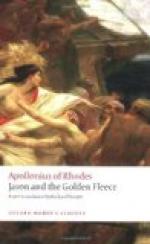[Footnote 1: i.e. river of fair dances.]
[Footnote 2: i.e. the bedchamber.]
Next they beheld the barrow of Sthenelus, Actor’s son, who on his way back from the valorous war against the Amazons—for he had been the comrade of Heracles—was struck by an arrow and died there upon the sea-beach. And for a time they went no further, for Persephone herself sent forth the spirit of Actor’s son which craved with many tears to behold men like himself, even for a moment. And mounting on the edge of the barrow he gazed upon the ship, such as he was when he went to war; and round his head a fair helm with four peaks gleamed with its blood-red crest. And again he entered the vast gloom; and they looked and marvelled; and Mopsus, son of Ampycus, with word of prophecy urged them to land and propitiate him with libations. Quickly they drew in sail and threw out hawsers, and on the strand paid honour to the tomb of Sthenelus, and poured out drink offerings to him and sacrificed sheep as victims. And besides the drink offerings they built an altar to Apollo, saviour of ships, and burnt thigh bones; and Orpheus dedicated his lyre; whence the place has the name of Lyra.
And straightway they went aboard as the wind blew strong; and they drew the sail down, and made it taut to both sheets; then Argo was borne over the sea swiftly, even as a hawk soaring high through the air commits to the breeze its outspread wings and is borne on swiftly, nor swerves in its flight, poising in the clear sky with quiet pinions. And lo, they passed by the stream of Parthenius as it flows into the sea, a most gentle river, where the maid, daughter of Leto, when she mounts to heaven after the chase, cools her limbs in its much-desired waters. Then they sped onward in the night without ceasing, and passed Sesamus and lofty Erythini, Crobialus, Cromna and woody Cytorus. Next they swept round Carambis at the rising of the sun, and plied the oars past long Aegialus, all day and on through the night.
And straightway they landed on the Assyrian shore where Zeus himself gave a home to Sinope, daughter of Asopus, and granted her virginity, beguiled by his own promises. For he longed for her love, and he promised to grant her whatever her heart’s desire might be. And she in her craftiness asked of him virginity. And in like manner she deceived Apollo too who longed to wed her, and besides them the river Halys, and no man ever subdued her in love’s embrace. And there the sons of noble Deimachus of Tricca were still dwelling, Deileon, Autolycus and Phlogius, since the day when they wandered far away from Heracles; and they, when they marked the array of chieftains, went to meet them and declared in truth who they were; and they wished to remain there no longer, but as soon as Argestes[1] blew went on ship-board. And so with them, borne along by the swift breeze, the heroes left behind the river Halys, and left behind Iris that flows hard by, and the delta-land of Assyria; and on the same day they rounded the distant headland of the Amazons that guards their harbour.




